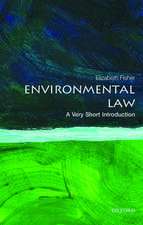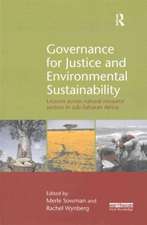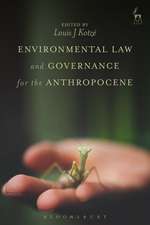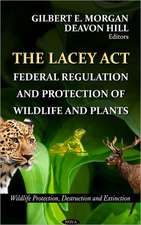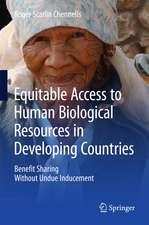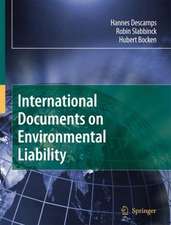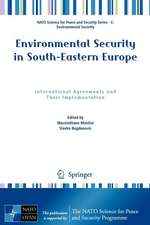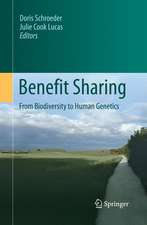Indigenous Peoples, Consent and Benefit Sharing: Lessons from the San-Hoodia Case
Editat de Rachel Wynberg, Doris Schroeder, Roger Chennellsen Limba Engleză Paperback – 15 noi 2009
Preț: 428.68 lei
Nou
Puncte Express: 643
Preț estimativ în valută:
82.04€ • 84.01$ • 68.24£
82.04€ • 84.01$ • 68.24£
Carte tipărită la comandă
Livrare economică 19 martie-02 aprilie
Preluare comenzi: 021 569.72.76
Specificații
ISBN-13: 9789048131228
ISBN-10: 9048131227
Pagini: 400
Ilustrații: XXXIII, 363 p. With online files/update.
Dimensiuni: 155 x 235 x 24 mm
Greutate: 0.59 kg
Ediția:2009
Editura: SPRINGER NETHERLANDS
Colecția Springer
Locul publicării:Dordrecht, Netherlands
ISBN-10: 9048131227
Pagini: 400
Ilustrații: XXXIII, 363 p. With online files/update.
Dimensiuni: 155 x 235 x 24 mm
Greutate: 0.59 kg
Ediția:2009
Editura: SPRINGER NETHERLANDS
Colecția Springer
Locul publicării:Dordrecht, Netherlands
Public țintă
Professional/practitionerCuprins
Community Consent and Benefit Sharing: The Context.- Justice and Benefit Sharing.- Informed Consent: From Medical Research to Traditional Knowledge.- Protecting the Rights of Indigenous Peoples: Can Prior Informed Consent Help?.- Bioprospecting, Access and Benefit Sharing: Revisiting the ‘Grand Bargain’.- Learning from the San.- Green Diamonds of the South: An Overview of the San-Hoodia Case.- Policies for Sharing Benefits from Hoodia.- The Struggle for Indigenous Peoples' Land Rights: The Case of Namibia.- Speaking for the San: Challenges for Representative Institutions.- Trading Traditional Knowledge: San Perspectives from South Africa, Namibia and Botswana.- Putting Intellectual Property Rights into Practice: Experiences from the San.- Sharing Benefits Fairly: Decision-Making and Governance.- Reflections.- The Role of Scientists and the State in Benefit Sharing: Comparing Institutional Support for the San and Kani.- The Law is not Enough: Protecting Indigenous Peoples' Rights Against Mining Interests in the Philippines.- Benefit Sharing is No Solution to Development: Experiences from Mining on Aboriginal Land in Australia.- Human Research Ethics Guidelines as a Basis for Consent and Benefit Sharing: A Canadian Perspective.- The Limitations of Good Intent: Problems of Representation and Informed Consent in the Maya ICBG Project in Chiapas, Mexico.- Conclusions and Recommendations.- Conclusions and Recommendations: Towards Best Practice for Community Consent and Benefit Sharing.
Recenzii
From the reviews:
“This book is an excellent series of papers that document the development of the San-Hoodia benefit-sharing agreement. … This book … is essential reading for anyone trying to bring a natural product to market and seeking a benefit-sharing partnership.” (Kristine Stewart, Economic Botany, Vol. 65 (2), 2011)
“This book is an excellent series of papers that document the development of the San-Hoodia benefit-sharing agreement. … This book … is essential reading for anyone trying to bring a natural product to market and seeking a benefit-sharing partnership.” (Kristine Stewart, Economic Botany, Vol. 65 (2), 2011)
Textul de pe ultima copertă
Indigenous Peoples, Consent and Benefit Sharing is the first in-depth account of the Hoodia bioprospecting case and use of San traditional knowledge, placing it in the global context of indigenous peoples’ rights, consent and benefit-sharing. It is unique as the first interdisciplinary analysis of consent and benefit sharing in which philosophers apply their minds to questions of justice in the Convention on Biological Diversity (CBD), lawyers interrogate the use of intellectual property rights to protect traditional knowledge, environmental scientists analyse implications for national policies, anthropologists grapple with the commodification of knowledge and, uniquely, case experts from Asia, Australia and North America bring their collective expertise and experiences to bear on the San-Hoodia case.
While much of the focus is on bioprospecting and natural product development, Indigenous Peoples, Consent and Benefit-Sharing also draws important lessons about informed consent and benefit-sharing from the health sciences and sectors such as mining. Policymakers around the world are under significant pressure to resolve the challenges of implementing the CBD. This book’s analysis and recommendations will help them.
‘It is good to see philosophers engaging with the UN Convention on Biological Diversity, and doing so by looking in depth at a real situation in which it has been invoked.’
Peter Singer, Ira W. DeCamp Professor of Bioethics in the University Center for Human Values, Princeton University
‘This book arrives at a critical juncture in the history of genetic resource use and policymaking - not only in southern Africa, but across that continent and, indeed, around the world. ABS Regime negotiators would do well to study closely the pages of this insightful and provocative volume.’
Timothy J. Hodges, Co-Chair UN CBD Working Group on Accessand Benefit Sharing of Genetic Resources (ABS)
‘A timely study of the way in which the key elements of the CBD relating to access to genetic resources - prior informed consent, benefit sharing - may, or may not, work in the real world, especially as it relates to the knowledge and innovations of indigenous peoples and local communities. Analytical, in-depth and insightful. An excellent work of scholarship.’
Gurdial Nijar, Director of the Centre of Excellence for Biodiversity Law [CEBLAW], Professor of Law, University of Malaya; Lead negotiator for Malaysia and the Like-Minded Megadiverse countries (LMMC) for The International ABS Regime
‘This is an eagerly anticipated book, extremely well researched, and uncovering in great detail many interesting issues that will be extremely valuable for the entire indigenous plant and traditional knowledge research and commercialisation fraternity – not only in southern Africa but worldwide.’
Cyril Lombard, Marketing Manager, PhytoTrade Africa
While much of the focus is on bioprospecting and natural product development, Indigenous Peoples, Consent and Benefit-Sharing also draws important lessons about informed consent and benefit-sharing from the health sciences and sectors such as mining. Policymakers around the world are under significant pressure to resolve the challenges of implementing the CBD. This book’s analysis and recommendations will help them.
‘It is good to see philosophers engaging with the UN Convention on Biological Diversity, and doing so by looking in depth at a real situation in which it has been invoked.’
Peter Singer, Ira W. DeCamp Professor of Bioethics in the University Center for Human Values, Princeton University
‘This book arrives at a critical juncture in the history of genetic resource use and policymaking - not only in southern Africa, but across that continent and, indeed, around the world. ABS Regime negotiators would do well to study closely the pages of this insightful and provocative volume.’
Timothy J. Hodges, Co-Chair UN CBD Working Group on Accessand Benefit Sharing of Genetic Resources (ABS)
‘A timely study of the way in which the key elements of the CBD relating to access to genetic resources - prior informed consent, benefit sharing - may, or may not, work in the real world, especially as it relates to the knowledge and innovations of indigenous peoples and local communities. Analytical, in-depth and insightful. An excellent work of scholarship.’
Gurdial Nijar, Director of the Centre of Excellence for Biodiversity Law [CEBLAW], Professor of Law, University of Malaya; Lead negotiator for Malaysia and the Like-Minded Megadiverse countries (LMMC) for The International ABS Regime
‘This is an eagerly anticipated book, extremely well researched, and uncovering in great detail many interesting issues that will be extremely valuable for the entire indigenous plant and traditional knowledge research and commercialisation fraternity – not only in southern Africa but worldwide.’
Cyril Lombard, Marketing Manager, PhytoTrade Africa
Caracteristici
First in-depth study of the world’s best known benefit sharing case First book on the topic of benefit sharing, which brings the collective knowledge of case experts from Asia, Australia and North America to critique the experience of their African counterparts for mutual learning Offers analysis and recommendations for policy makers under significant pressure to resolve the challenges of implementing the Convention on Biological Diversity (CBD)


